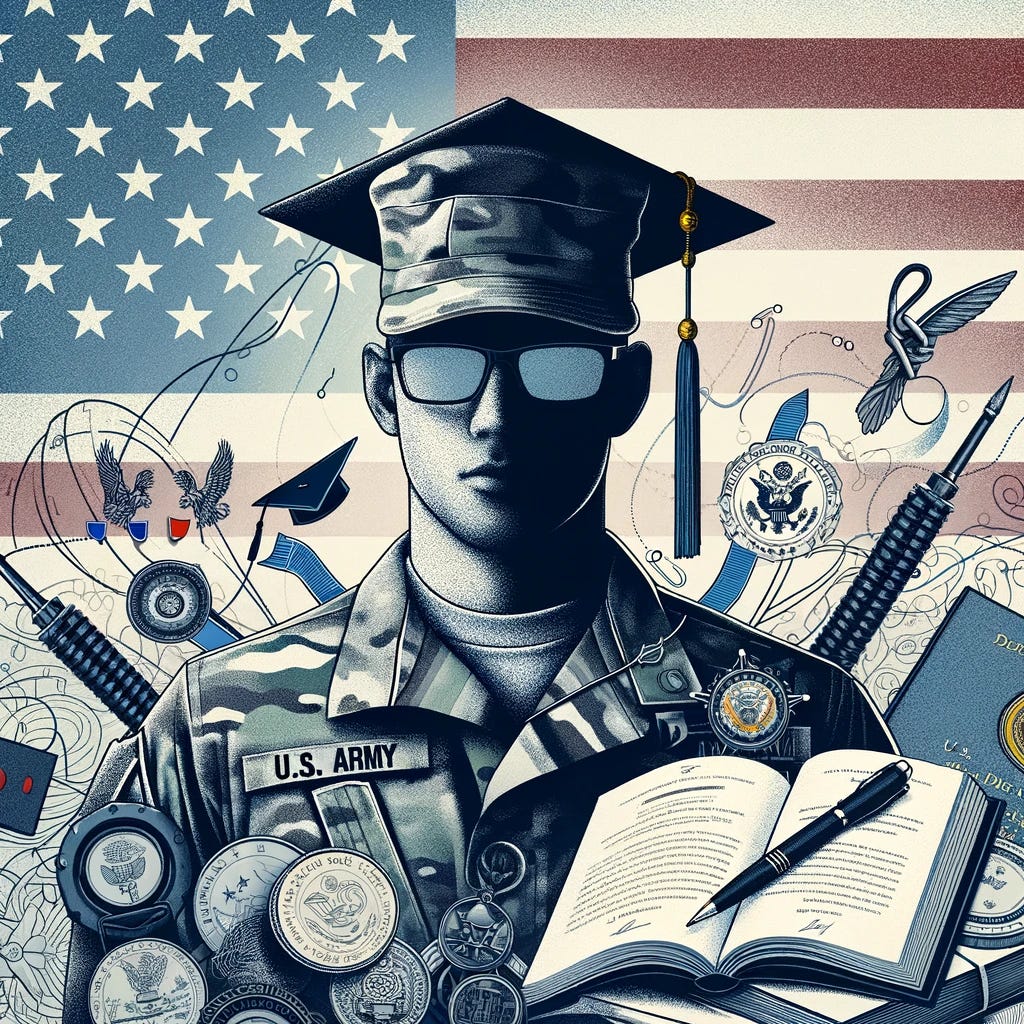Defining the Benefits of College Education for Enlisted Soldiers
If you walked around your formation and asked your enlisted Soldiers the value of obtaining a college degree, what would they say?
Their answers would likely focus on promotion. The importance placed on pursuing and obtaining a college education recurs across Army publications, from the Department of the Army non-commissioned officer (NCO) professional development guide to the published Regular Army SSG, SFC, and MSG centralized non-commissioned officer (NCO) evaluation board field after action reviews.
Surprisingly, the Army has never codified the rationale for emphasizing college education for NCOs—a finding revealed in my dissertation research. This lack of clarity leads to a vague and inconsistent understanding of why enlisted Soldiers should pursue a college education. The Department of the Army should publish guidance clearly defining the intent behind recommending higher education in the Army leader development model.
As the Army senior leaders look to strengthen the profession, a doctrinal definition of what modern professionals and professional education looks like, at echelon, with a clearly defined intent, would support implementation across the Army through published Army doctrine. By identifying the cognitive skills desired from the process of pursuing and obtaining a college education, Soldiers at all levels would be offered the succinct explanation of why such pursuits are encouraged by the Army. In turn, this firm understanding of the intent would allow for Soldiers to focus not only on earning their degree but ensure they are developing the cognitive skills desired by the emphasis on education.
I discovered this disconnect while doing my doctoral dissertation on senior NCO higher education. Specifically, my research focused on the decision by senior NCOs to pursue higher education, and how their raters and senior raters viewed that decision. To gather information, I administered a 15-question survey with demographic, Likert-scale, and open-ended short-response questions. A total of 46 participants, hailing from 13 various U.S. Army Signal Corps Brigades and other eligible U.S. Army organizations answered the online survey questionnaire. The study revealed that senior NCO raters and senior raters view pursuing and obtaining a college education as nurturing beneficial skills, and that view is reflected in their comments in their annual evaluations.
85% of participants who occupied either a rater or senior rater role stated they viewed a college-educated NCO Corps as being an advantage or benefit to the profession. These leaders voiced the belief that the pursuit and obtainment of a college education was in line with the principle of life-long learning and developed skills that were valued by leadership. Recurring themes included the development of higher levels of reading and writing comprehension, demonstrated intrinsic drive and self-reliance, stimulated convergent, divergent, and lateral thinking, and increased levels of critical thinking along with problem solving capabilities. Both Soldiers and senior leaders valued the skills associated with higher education and recognized those skills with higher ratings on annual evaluation reports.
However, my research identified a disconnect between NCOs, their raters, and senior raters regarding why pursuing and obtaining a college education is viewed positively. Of the enlisted participants who submitted feedback on this topic, 24 of 32 stated they believe that attending college would be viewed favorably by their raters and senior raters, would reflect positively on their NCOERs, and would help secure a stronger position on the promotion list. For these NCOs, the desire for promotion to the next grade was the prime mover behind their decision to pursue and obtain a college degree.
This research demonstrated a disconnect regarding the reason for emphasizing college education for the Army’s NCOs. The overwhelming majority of enlisted Soldiers participants viewed pursuing and obtaining a college education as a key element to getting promoted to the next rank. In comparison, rater and senior rater participants voiced the opinion that such pursuits were beneficial to the growth of an NCO and developed various skills that were beneficial to the profession. This knowledge gap has directly nurtured an environment in which obtaining a degree, regardless of the field of study or rigor, has become the goal of many enlisted Soldiers over the personal development that comes with an academic journey.
The recurring theme voiced throughout this study was the participant’s emphasis of career advancement gained from pursuing and obtaining a college education over the skills such academic endeavors aim to develop. Currently, these skills are not adequately communicated across the Army, which risks trammeling the natural aptitudes of the Army’s Soldiers.
The widespread belief that pursuing a college education is predominately to remain competitive for promotion is an issue that must actively be addressed. The USARMY Pentagon HQDA DCS G-1 / Military Publishing Policy Directorate can address this by publishing clearly codified guidance in publications such as the NCO professional development guide (DA Pam 600-25). Soldiers cannot meet the intent without knowing what the intent is.
Naming the desired cognitive skills for development through such academic endeavors would clearly define the intent behind the current emphasis on education. Enlisted Soldiers' untapped talent could prove pivotal in not only better meeting the Army Senior Leader’s call for strengthening the profession but also deciding the outcomes of future conflicts with peer and near-peer adversaries.
Wolfgang McLachlan spent the first 10 of his 19+ year Army career as an Airborne Infantryman with combat tours in both Iraq and Afghanistan before serving as an Infantry OSUT Senior Drill Sergeant. He later medical reclassified to 25S (Satellite Communication Systems Operator-Maintainer) and served in Korea and United States Army Space and Missile Defense Command. Currently he is serving as the 1SG of United States Army Network Enterprise Center Fort Wainwright/Greely, Alaska as part of the 59th Signal Battalion supporting Department of Defense communication initiates in the Arctic.



